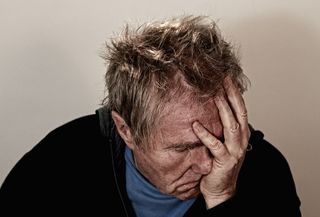
[Article revised on 26 April 2020.]
Like heart disease or diabetes, depression can be highly debilitating, even fatal. But unlike heart disease or diabetes, it is poorly understood and heavily stigmatized.
People with depression are often seen as "failures" or "losers", too feeble or lazy to pick themselves up or pull themselves together.
Of course, nothing could be further from the truth. If you feel the way you do, it is most probably because you tried too hard or took on too much, so hard and so much that you made yourself ill with depression.
In other words, if you feel the way you do, it is because your world was simply not good enough for you. You wanted more, you wanted better, and you wanted different, not just for yourself but for all those around you.
So if you’re a "failure" or a "loser", that’s only because you set the bar far too high. You could have swept everything under the carpet and pretended, as many people do, that all is for the best in the best of possible worlds. But instead you had the honesty and the strength to admit that something was amiss, that something was not quite right.
So rather than being a failure or loser, you are all the opposite: you are ambitious, you are truthful, and you are courageous. And that is how you got here.
But unlike heart disease or diabetes, depression can have a silver lining.
Crushing though it may be, depression can present a precious opportunity to identify and address deep and difficult life problems.
Just as physical pain evolved to signal injury and prevent further injury, so depression may have evolved to remove us from distressing, damaging, or futile situations.
What’s more, the time and space and solitude that depression affords encourage us to reconnect with our bigger picture and reconsider how we relate to ourselves, to others, and to the world.
In short, your depression could be your way of telling yourself that something is seriously wrong and needs working through and changing, or, at the very least, processing and understanding.
Sometimes, we become so immersed in the humdrum of everyday life that we no longer have the opportunity or perspective to think and feel about ourselves. The adoption of the depressive position compels us to cast off the pollyanna-ish optimism and rose-tinted spectacles that shield us from reality, stand back at a distance, re-evaluate our needs and priorities, and formulate a modest but realistic plan for fulfilling them.
At a deeper level, the adoption of the depressive position enables us to develop a clearer understanding of ourselves, our lives, and life in general. From an existential standpoint, it obliges us to become aware of our mortality and freedom, and challenges us to exercise the latter within the framework of the former. By meeting this difficult challenge, we are able to break out of the mould that has been imposed upon us, discover who we truly are, and, in so doing, begin to give deep meaning to our lives.
It can be no surprise that many of the most creative and insightful people in society and history suffer or suffered from depression, or a state that could have been diagnosed as depression.
They include the politicians Winston Churchill and Abraham Lincoln; the poets Charles Baudelaire, Elizabeth Bishop, Hart Crane, Emily Dickinson, Sylvia Plath, and RM Rilke; the thinkers Michel Foucault, William James, JS Mill, Friedrich Nietzsche, and Arthur Schopenhauer; and the writers JK Rowling, Agatha Christie, Charles Dickens, William Faulkner, Graham Greene, Leo Tolstoy, and Evelyn Waugh, among many, many others.
To quote Marcel Proust, who himself suffered from depression, ‘Happiness is good for the body, but it is grief which develops the strengths of the mind.’
The concept of depression as a mental disorder may be helpful for the more severe and intractable cases treated by psychiatrists like myself, but probably not for the majority of cases, which, for the most part, are mild and short-lived and readily interpreted in terms of life circumstances, human nature, or the human condition.
Thinking of unhappiness or withdrawal in terms of a mental disorder or a chemical imbalance in the brain can be counterproductive, insofar as it can prevent us from identifying and addressing the important psychological or life problems that are at the root of our distress.
Maybe all this is more common sense than philosophy, but I do think it merits saying.
Neel Burton is author of Growing from Depression and other books.




